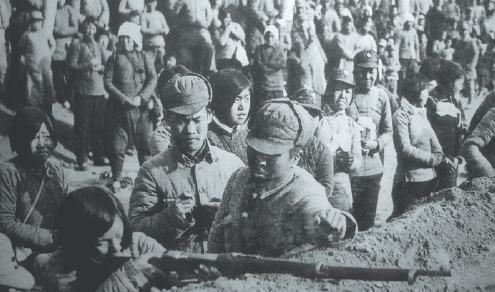 |
|
A woman learns how to shoot during the war. The guerrillas patrolled constantly, searching for small groups of Japanese and puppet army troops to attack. CHINA DAILY |
The guerrillas patrolled constantly, searching for small groups of Japanese and puppet army troops to attack, but life in the mountains was difficult.
A shortage of food and the use of melted snow as drinking water resulted in many of the guerrillas contracting serious fevers and their wounds becoming infected.
Unable to hunt wild animals for food in case the gunshots were heard by the Japanese, the guerrillas began eating tree bark, but quickly stopped when they realized the trail of stripped trees would lead their enemies to them.
Lacking medical supplies, the guerrillas learned to use different plants to clean and sterilize wounds. "We didn't have any simple medical equipment for dealing with gunshot wounds, let alone medicines such as anesthetics," Li recalled.
The guerrillas "disinfected" gunshot wounds by wrapping a hot ramrod in a clean strip of cloth, inserting it into a wound and retracting it, then repeating the process until the rotten flesh had been cleared away.
"The only way to comfort the soldiers suffering the unspeakable pain was to tell them they would be able to keep fighting after they recovered," she said.
The war was not just cruel in combat situations, though. The guerrillas were strict disciplinarians, and Li remembers how a soldier was executed because he had slept during sentry duty.
There were also moments of peace, short in duration but long-lived in the memory. In the summer, when the flowers blossomed in the valleys, Li picked bunches to wear in her hair or to decorate the tents they had captured from the Japanese.
"Sometime we danced and sang as if there was never a war," said Li, who added that the guerrillas were always alert to the danger of surprise attacks.
Li often fought alongside Pei Chengchun, an older female guerrilla who cared for Li like a mother.
"Pei was a tough soldier during a fight, but she was a gentle woman when she was looking after me and the other young soldiers," she said.
However, one day when Li was patrolling around the camp, she discovered Pei hiding behind a tree and weeping. "She had just learned that her younger brother had been killed in combat. That was the first and last time I saw her cry," Li said.
Pei died in battle at age 31 as she provided covering fire for her comrades.